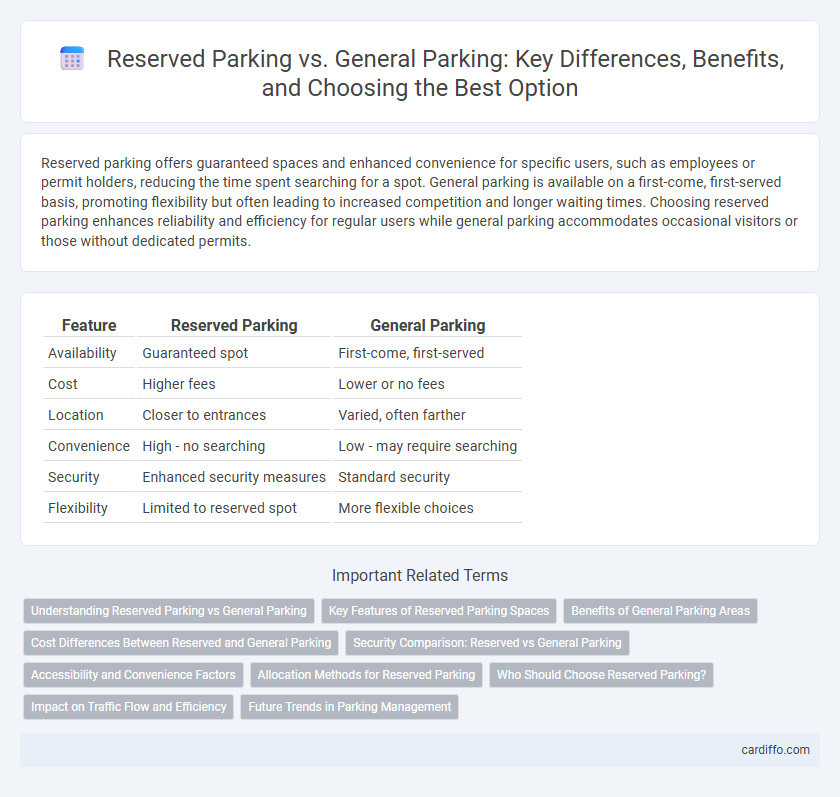Reserved parking offers guaranteed spaces and enhanced convenience for specific users, such as employees or permit holders, reducing the time spent searching for a spot. General parking is available on a first-come, first-served basis, promoting flexibility but often leading to increased competition and longer waiting times. Choosing reserved parking enhances reliability and efficiency for regular users while general parking accommodates occasional visitors or those without dedicated permits.
Table of Comparison
| Feature | Reserved Parking | General Parking |
|---|---|---|
| Availability | Guaranteed spot | First-come, first-served |
| Cost | Higher fees | Lower or no fees |
| Location | Closer to entrances | Varied, often farther |
| Convenience | High - no searching | Low - may require searching |
| Security | Enhanced security measures | Standard security |
| Flexibility | Limited to reserved spot | More flexible choices |
Understanding Reserved Parking vs General Parking
Reserved parking offers designated spaces allocated to specific individuals or groups, ensuring guaranteed availability and security, whereas general parking provides open spots available on a first-come, first-served basis, often leading to variability in accessibility. Reserved parking is commonly utilized in corporate offices, residential complexes, and event venues to manage vehicle organization efficiently. In contrast, general parking caters to transient vehicles and visitors, emphasizing convenience but lacking guaranteed space allocation.
Key Features of Reserved Parking Spaces
Reserved parking spaces offer guaranteed availability, eliminating the need to search for open spots and reducing time spent parking. These spaces often provide enhanced security features such as surveillance cameras and controlled access, ensuring vehicle safety. Additionally, reserved spots are strategically located for convenience, typically closer to entrances or facilities, making them ideal for frequent users or those with specific accessibility needs.
Benefits of General Parking Areas
General parking areas offer increased accessibility for all vehicle types without requiring prior reservations, making them ideal for spontaneous or short-term visits. These lots typically have higher capacity and turnover rates, reducing wait times and enhancing convenience for diverse users. Cost efficiency is another advantage, as general parking often comes at lower rates compared to reserved spaces, optimizing budget-friendly options for daily commuters and casual drivers.
Cost Differences Between Reserved and General Parking
Reserved parking typically incurs higher fees than general parking due to guaranteed spaces and added convenience. General parking offers lower costs but lacks the assurance of a specific spot, often leading to time spent searching for availability. Businesses and urban planners balance these pricing strategies to optimize revenue and user experience in parking facilities.
Security Comparison: Reserved vs General Parking
Reserved parking spaces offer enhanced security through controlled access and personalized allocation, reducing the risk of unauthorized entry and vehicle theft. General parking areas often lack individualized monitoring, increasing vulnerability to vandalism and theft due to higher traffic and less supervision. Advanced security measures in reserved parking, such as gated barriers and surveillance cameras, significantly improve vehicle protection compared to open general parking lots.
Accessibility and Convenience Factors
Reserved parking spaces offer enhanced accessibility by guaranteeing a dedicated spot near building entrances, reducing walking distance and time, especially for individuals with mobility challenges. General parking often requires searching for available spots, which can lead to longer walks and decreased convenience in finding accessible locations. The consistent availability and proximity of reserved parking significantly improve convenience and accessibility compared to the unpredictability of general parking areas.
Allocation Methods for Reserved Parking
Reserved parking allocation methods typically involve pre-assigned spaces based on permit systems or subscription models, ensuring designated spots for specific users. These methods often use digital platforms or access control technologies like RFID or license plate recognition to manage and enforce parking rights efficiently. In contrast, general parking relies on first-come, first-served availability without guaranteed spots, making reserved systems essential for predictable space management in high-demand areas.
Who Should Choose Reserved Parking?
Reserved parking is ideal for commuters who require guaranteed access to a specific spot due to tight schedules or frequent visits to the same location. Employees working long shifts or residents in high-demand urban areas benefit from the convenience and security reserved parking offers. Businesses aiming to provide VIP services or prioritize accessibility for clients also find reserved parking a strategic choice.
Impact on Traffic Flow and Efficiency
Reserved parking spaces reduce congestion by minimizing the time drivers spend searching for available spots, thereby improving overall traffic flow within parking facilities. In contrast, general parking areas can lead to increased circulation and delays as drivers navigate unpredictably to find open spaces. Strategic allocation of reserved parking for frequent users or employees enhances operational efficiency and streamlines vehicle movement.
Future Trends in Parking Management
Reserved parking spaces, equipped with IoT sensors and real-time occupancy data, improve efficiency by guaranteeing spot availability for subscribers, while general parking benefits from dynamic pricing and AI-powered demand forecasting to optimize utilization. Integration of autonomous vehicle technology forecasts a shift towards smart parking systems that allocate spaces based on predictive analytics and user preferences. Urban planners increasingly prioritize multi-modal transport integration, with parking management evolving to support electric vehicle charging infrastructure and seamless digital payment platforms.
Reserved parking vs general parking Infographic

 cardiffo.com
cardiffo.com